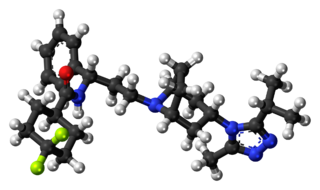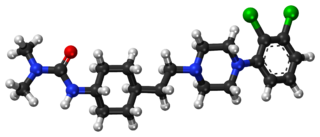Related Research Articles

Alprazolam, sold under the brand name Xanax among others, is a fast-acting, potent tranquilizer of moderate duration within the triazolobenzodiazepine group of chemicals called benzodiazepines. Alprazolam is most commonly prescribed in the management of anxiety disorders, especially panic disorder and generalized anxiety disorder (GAD). Other uses include the treatment of chemotherapy-induced nausea, together with other treatments. GAD improvement occurs generally within a week. Alprazolam is generally taken orally.

Methyltestosterone, sold under the brand names Android, Metandren, and Testred among others, is an androgen and anabolic steroid (AAS) medication which is used in the treatment of low testosterone levels in men, delayed puberty in boys, at low doses as a component of menopausal hormone therapy for menopausal symptoms like hot flashes, osteoporosis, and low sexual desire in women, and to treat breast cancer in women. It is taken by mouth or held in the cheek or under the tongue.
Therapeutic drug monitoring (TDM) is a branch of clinical chemistry and clinical pharmacology that specializes in the measurement of medication levels in blood. Its main focus is on drugs with a narrow therapeutic range, i.e. drugs that can easily be under- or overdosed. TDM aimed at improving patient care by individually adjusting the dose of drugs for which clinical experience or clinical trials have shown it improved outcome in the general or special populations. It can be based on a a priori pharmacogenetic, demographic and clinical information, and/or on the a posteriori measurement of blood concentrations of drugs (pharmacokinetic monitoring) or biological surrogate or end-point markers of effect (pharmacodynamic monitoring).

Galantamine is a type of acetylcholinesterase inhibitor. It is an alkaloid extracted from the bulbs and flowers of Galanthus nivalis, Galanthus caucasicus, Galanthus woronowii, and other members of the family Amaryllidaceae, such as Narcissus (daffodil), Leucojum aestivum (snowflake), and Lycoris including Lycoris radiata. It can also be produced synthetically.

Clomipramine, sold under the brand name Anafranil among others, is a tricyclic antidepressant (TCA). It is used in the treatment of various conditions, most notably obsessive–compulsive disorder but also many other disorders, including hyperacusis, panic disorder, major depressive disorder, trichotillomania, body dysmorphic disorder and chronic pain. It has also been notably used to treat premature ejaculation and the cataplexy associated with narcolepsy.

Renzapride is a prokinetic agent and antiemetic which acts as a full 5-HT4 agonist and partial 5-HT3 antagonist. It also functions as a 5-HT2B antagonist and has some affinity for the 5-HT2A and 5-HT2C receptors.

Nandrolone decanoate, sold under the brand names Rolon and Deca-Durabolin, among others, is an androgen and anabolic steroid (AAS) medication which is used primarily in the treatment of anemias and wasting syndromes, as well as osteoporosis in menopausal women. It is given by injection into muscle or fat once every one to four weeks.

Sodium stibogluconate, sold under the brand name Pentostam among others, is a medication used to treat leishmaniasis. This includes leishmaniasis of the cutaneous, visceral, and mucosal types. Some combination of miltefosine, paromomycin and liposomal amphotericin B, however, may be recommended due to issues with resistance. It is given by injection.

Maraviroc, sold under the brand names Selzentry (US) and Celsentri (EU), is an antiretroviral medication used to treat HIV infection. It is taken by mouth. It is in the CCR5 receptor antagonist class.
A dose is a measured quantity of a medicine, nutrient, or pathogen that is delivered as a unit. The greater the quantity delivered, the larger the dose. Doses are most commonly measured for compounds in medicine. The term is usually applied to the quantity of a drug or other agent administered for therapeutic purposes, but may be used to describe any case where a substance is introduced to the body. In nutrition, the term is usually applied to how much of a specific nutrient is in a person's diet or in a particular food, meal, or dietary supplement. For bacterial or viral agents, dose typically refers to the amount of the pathogen required to infect a host.

Cefditoren, also known as cefditoren pivoxil is an antibiotic used to treat infections caused by Gram-positive and Gram-negative bacteria that are resistant to other antibiotics. It is mainly used for treatment of community acquired pneumonia. It is taken by mouth and is in the cephalosporin family of antibiotics, which is part of the broader beta-lactam group of antibiotics.

Estradiol benzoate (EB), sold under the brand name Progynon-B among others, is an estrogen medication which is used in hormone therapy for menopausal symptoms and low estrogen levels in women, in hormone therapy for transgender women, and in the treatment of gynecological disorders. It is also used in the treatment of prostate cancer in men. Estradiol benzoate is used in veterinary medicine as well. When used clinically, the medication is given by injection into muscle usually two to three times per week.

Vortioxetine, sold under the brand name Trintellix and Brintellix among others, is an antidepressant medication of the serotonin modulator and stimulator (SMS) class used in the treatment of major depressive disorder. Its effectiveness is viewed as similar to that of other antidepressants. It is taken orally.

Cariprazine, sold under the brand name Vraylar among others, is an atypical antipsychotic developed by Gedeon Richter, which is used in the treatment of schizophrenia, bipolar mania, bipolar depression, and as an add-on therapy for major depressive disorder. It acts primarily as a D3 and D2 receptor partial agonist, with a preference for the D3 receptor. Cariprazine is also a partial agonist at the serotonin 5-HT1A receptor and acts as an antagonist at 5-HT2B and 5-HT2A receptors. It is taken by mouth. The most prevalent side effects include nausea, mild sedation, fatigue, and dizziness. At higher dosages, there is an increased risk for restlessness, insomnia, and tremors.

Suvorexant, sold under the brand name Belsomra, is an orexin antagonist medication which is used in the treatment of insomnia. It is indicated specifically for the treatment of insomnia characterized by difficulties with sleep onset and/or maintenance in adults. Suvorexant helps with falling asleep faster, sleeping longer, being awake less in the middle of the night, and having better quality of sleep. Its effectiveness is modest, and is similar to that of other orexin antagonists, but is lower than that of benzodiazepines and Z-drugs. Suvorexant is taken by mouth.

Aticaprant, also known by its developmental codes JNJ-67953964, CERC-501, and LY-2456302, is a κ-opioid receptor (KOR) antagonist which is under development for the treatment of major depressive disorder. A regulatory application for approval of the medication is expected to be submitted by 2025. Aticaprant is taken by mouth.

Ledipasvir/sofosbuvir, sold under the trade name Harvoni among others, is a medication used to treat hepatitis C. It is a fixed-dose combination of ledipasvir and sofosbuvir. Cure rates are 94% to 99% in people infected with hepatitis C virus (HCV) genotype 1. Some evidence also supports use in HCV genotype 3 and 4. It is taken daily by mouth for 8–24 weeks.
Darolutamide, sold under the brand name Nubeqa, is an antiandrogen medication which is used in the treatment of non-metastatic castration-resistant prostate cancer in men. It is specifically approved to treat non-metastatic castration-resistant prostate cancer (nmCRPC) in conjunction with surgical or medical castration. The medication is taken by mouth twice per day with food.

Elagolix, sold under the brand name Orilissa, is a gonadotropin-releasing hormone antagonist medication which is used in the treatment of pain associated with endometriosis in women. It is also under development for the treatment of uterine fibroids and heavy menstrual bleeding in women. The medication was under investigation for the treatment of prostate cancer and enlarged prostate in men as well, but development for these conditions was discontinued. Elagolix is taken by mouth once or twice per day. It can be taken for up to 6 to 24 months, depending on the dosage.
Model-Informed Precision Dosing is the use of pharmacometric models with computer software to optimize drug dosage for an individual patient.
References
- ↑ Rowbotham S, Conte K, Hawe P (June 2019). "Variation in the operationalisation of dose in implementation of health promotion interventions: insights and recommendations from a scoping review". Implementation Science. 14 (1): 56. doi: 10.1186/s13012-019-0899-x . PMC 6555031 . PMID 31171008.
- ↑ Tyson RJ, Park CC, Powell JR, Patterson JH, Weiner D, Watkins PB, Gonzalez D (2020). "Precision Dosing Priority Criteria: Drug, Disease, and Patient Population Variables". Frontiers in Pharmacology. 11: 420. doi: 10.3389/fphar.2020.00420 . PMC 7188913 . PMID 32390828.
- ↑ Choudhary D, Goykar H, Kalyane D, Desai N, Tekade RK (January 2021). "Dose, dosage regimen, and dose adjustment in organ failure.". Biopharmaceutics and pharmacokinetics considerations. Academic Press. pp. 29–82. doi:10.1016/B978-0-12-814425-1.00004-8. ISBN 978-0-12-814425-1.
- ↑ Korn EL, Moscow JA, Freidlin B (May 2023). "Dose optimization during drug development: whether and when to optimize". Journal of the National Cancer Institute. 115 (5): 492–497. doi:10.1093/jnci/djac232. PMC 10165487 . PMID 36534891.